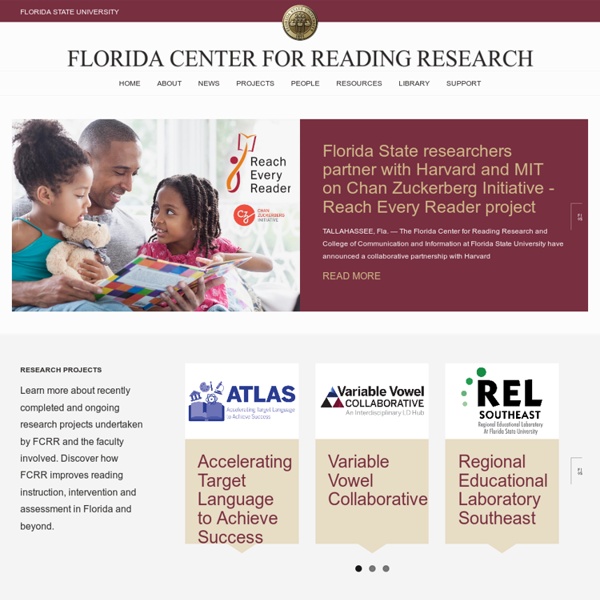What are DIBELS®?
Roland H. Good, III, PhD and Ruth A. Kaminski, PhD DIBELS® Overview DIBELS are individually administered measures of student skills in each of the key basic early literacy skills.
Fountas & Pinnell
Supporting Materials Guided Reading: The Romance and the Reality This article was published in The Reading Teacher Vol. 66 Issue 4 Dec 2012 / Jan 2013. In this article Fountas and Pinnell examine the growth and impact of guided reading, small group teaching for differentiated instruction in reading that was inspired by their early publications. Guided reading has shifted the lens in the teaching of reading to a focus on a deeper understanding of how readers build effective processing systems over time and an examination of the critical role of texts and expert teaching in the process.
Developing Reading skills
There is always a debate about teaching reading at F.E level to students with a learning disability(i.e teach them to use the skills they already have rather than learning using phonics) If you do want to have a go at using phonics and teaching tricky words here are some links to help you: A guide from DFES Letters and Sounds guidance from Department of EducationAn introduction to synthetic phonics from dyslexics.org.uk An over view of how and when to introduce the sounds and words can be found at:
Response: Several Ways To Help Students Become Better Listeners - Classroom Q&A With Larry Ferlazzo
UserID: iCustID: IsLogged: false IsSiteLicense: false
Academic Word Finder
Academic Word Finder Author: Student Achievement Partners Date Added: 12/02/14 | Adjusted: 03/11/15 Grades K–High School
Learning Disabilities in Children: Symptoms, Types, and Testing
What are learning disabilities? Learning disabilities, or learning disorders, are an umbrella term for a wide variety of learning problems. A learning disability is not a problem with intelligence or motivation. Kids with learning disabilities aren’t lazy or dumb. In fact, most are just as smart as everyone else. Their brains are simply wired differently.
Ten Steps to Better Student Engagement
Tristan de Frondeville As a teacher, my goal was to go home at the end of each day with more energy than I had at the beginning of the day. Seriously. Now, as I travel the country coaching teachers on how to successfully use project learning, my goal remains the same.
New ‘Dyslexie’ font helps dyslexics read better
AFP/ Those in a study of the font say it improves reading accuracy. A graphic designer from the Netherlands, Christian Boer, has developed a new font to aid his dyslexia. The font, called Dyslexie, isn’t the first of its kind, but according to Scientific American in an article published Wednesday, “it has received much fanfare from sufferers.”
Accommodations and Modifications
Accommodations, modifications, and alternative assessments may be necessary for a special needs child to succeed while working on materials for learning. A student who cannot read nor write at grade level may be able to understand and participate in discussions about material that is read aloud and taught at the child's age-appropriate level. A child who cannot recall basic number facts may be able to do grade-appropriate problems using a calculator or working with number facts chart.
Math, English programs, games, worksheets for grades K-8 - Dositey.com educational site
Enjoy a wide range of lessons, practice exercises, step-by-step tutorials, and printable worksheets... Try today: Grades K-2: Phonics, Adding Same Numbers, Beginning Fractions
Misunderstood Minds . Resources
The following resources offer material you can use to become more informed about learning disabilities and differences. They encompass a broad range of viewpoints and approaches to the issues. The list is compiled from books, Web sites, articles, and videos that we consulted during the production of this Web site, or that our advisors recommended. Further guidance about how to find resources in your community is offered below. All links were current as of March 13, 2002. General
30 Ideas for Teaching Children with Attention-Deficit/Hyperactivity Disorder by Leah Davies, M.Ed.
By Leah Davies, M.Ed. The following list may assist teachers who work with ADHD students. For an overview of this disorder see, "Attention-Deficit/Hyperactivity Disorder in Children."



